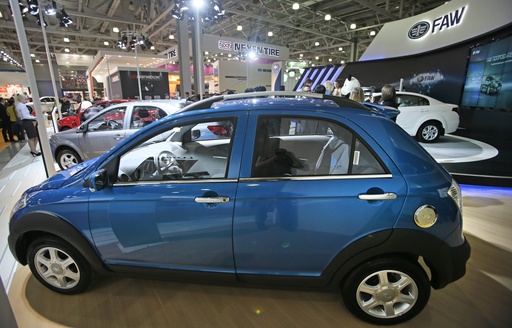BEIJING (AP) — In Beijing and Kyiv, the divide between China and Europe over the war in Ukraine was on display this week.
As a Chinese envoy crisscrossed Europe for talks on ending the war, his boss, Foreign Minister Wang Yi, trumpeted a sharp rise in China-Russia trade — which the West sees as providing an economic lifeline to Moscow that undermines the sanctions it has imposed to try to pressure Russia to withdraw from Ukraine.
“Russian natural gas has entered thousands of households in China, and Chinese cars are driving in the streets of Russia, which fully demonstrates the strong resilience and broad prospects of mutually beneficial cooperation,” Wang said at an annual news conference on Thursday.
Hours later, Chinese envoy Li Hui was given a rundown of the horrors of the war by Ukrainian officials in Kyiv. It wasn’t clear how Li reacted. China released a terse statement on Friday saying only that Li arrived by train at noon, held candid and friendly talks, and departed by train the same evening.
The war has created a deep division between the West and China that threatens Beijing’s relations with Europe, a major trading partner, and further strained ties with the United States.
The U.S. and Europe have asked China and its leader, Xi Jinping, to use their close relationship with Russian President Vladimir Putin to persuade him to end the war. That seems unlikely based on China’s official statements and state media coverage.
“We are opposed to any attempt to blame China or to shift the responsibility of resolving the Ukraine crisis to China,” Wang, the foreign minister, said last month at the Munich Security Conference in Germany.
China has criticized sanctions on Russia rather than joining them and has accused the West of fueling the fighting by providing Ukraine with weaponry for its defense. It avoids the words “war” and “invasion” to describe the conflict and cites NATO expansion as a root cause.
“What is the use of sanctions against Russia after all these years of sanctions from the West?” said Li Xin, the director of the Institute of European and Asian Studies of Shanghai University of Political Science and Law. “Other countries should act like China. Pouring fuel onto fire and providing weapons and ammunition to Ukraine will never solve the problem.”
Expectations were low ahead of Li’s trip to Kyiv on Thursday as part of his second European tour to seek a settlement of what China calls the Ukraine crisis. He started in Moscow last weekend, then met EU and Swiss officials in Brussels and held talks in Poland before his half-day visit to the Ukrainian capital. From there, he was scheduled to visit Germany and France.
On his first trip in May 2023, he did little more than lay out China’s position, said Abigael Vasselier, at the time an EU official who joined the talks.
“They are not ready to change their position on Russia and in that sense, it makes them not a credible actor to find any common ground with all of us,” said Vasselier, who now heads the foreign relations team at the Mercator Institute for Chinese Studies in Berlin.
His meeting with Swiss diplomat Gabriel Luechinger in Brussels on Tuesday received some attention because China has yet to say whether it will participate in a peace conference that Switzerland is trying to organize in the spring.
In Poland, Deputy Foreign Minister Wladyslaw Bartoszewski told Li that China should not provide political, economic and military support to Russia and that he disagreed with attempts to justify Russia’s invasion by citing its security concerns.
A statement from Ukraine said its talks with Li included possible Chinese assistance with prisoner exchanges, the return of Ukrainian children in Russia and the return of the Zaporizhzhia nuclear power plant, which Russia took control of during fighting in 2022.
“It is very important that you hear firsthand about the situation on the front line, what is happening and where we are,” Andriy Yermak, the head of the presidential office, was quoted as telling Li.
China’s trade with Russia was already rising rapidly before the war and has continued to do so through it, more than doubling from $108 billion in 2020 to $240 billion in 2023.
Chinese automakers moved in as their Western counterparts pulled out. Russia, not even one of the top 10 destinations for China-made autos in 2022, leaped to the top of the list last year.
More than 900,000 vehicles were exported to Russia in 2023, far exceeding the 415,000 to Mexico, the second largest market, the China Association of Automobile Manufacturers said last week, citing Chinese customs data.
The EU and U.S. announced new sanctions two weeks ago on companies and individuals believed to be supporting the Russian war effort, including some from China. Around the same time, the U.S. ambassador in Beijing had harsh words for China’s position on the war.
“China’s silence on the existential issue of Ukraine’s sovereignty and independence is deafening,” Nicholas Burns said at an event marking the second anniversary of the Russian invasion. “And its support to Russia is very troubling indeed.”
___
Associated Press researcher Yu Bing contributed to this report.



